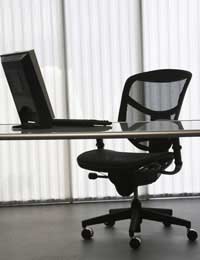Designing Offices for Privacy

If offices were to be designed solely to ensure the privacy of their occupants, each employee would be cocooned in a soundproof booth or isolated a long way from the nearest person. However, most employers understand the role that employee interaction plays in their productivity, and clearly this is at odds with confidentiality.
This article will examine the factors that play a role in the overall privacy that workers can achieve within a workspace, and explain the tradeoffs between this and the other concerns of the business.
Worker Density
Because commercial property tends to have fixed costs based on its floor area, it can seem cost-effective to cram as many people into the space as possible. Some organisations take this to extremes, generating vast “cube farms” in which a sprawling area is divided by partitions to give everyone a cubicle, all of which are packed tightly together.Of course, it is better if employees are not packed together “cheek by jowl”. However, even when an organisation’s logistics or financial situation necessitate a high density of workers, it is possible to give them some degree of privacy. For example, partitions between consecutive desks can help to prevent distractions and can give a sense of seclusion even within a busy environment.
Preventing Sound from Travelling
The choice of environmental materials in an open-plan area can have a dramatic impact on how far sound, such as telephone conversations, can travel. Obviously, if this distance can be minimised, then workers will enjoy greater privacy when they are talking on the phone.Taller panels between cubicles can reduce sound propagation, as can a good choice for the surface materials of floors, walls and ceilings. Softer materials tend to absorb more sound energy than do harder materials, and so this should be a consideration when it comes to designing the office space.
Even in an open-plan workspace, it is necessary to have private conference rooms, with reasonably thick walls to ensure that conversations taking place inside can remain confidential.
A Safe Harbour from Surveillance
In a business where it is necessary to monitor or record staff telephone calls, it is good practice to provide an alternative service that is not subject to this surveillance for staff to use for personal calls.Similarly, if there is a need to use CCTV to watch over staff in the workplace (for example, on a shop floor) then it is worthwhile to provide an unmonitored staff room or other facilities for staff to use for their breaks. This gives them relief from the feeling that they are constantly in the spotlight and is good for morale.


Re: Contacting Employees in Their Homes
Vertyowdiwjodko kofkosfjwgojfsjf oijwfwsfjowehgewjiofwj jewfkwkfdoeguhrfkadwknfew ijedkaoaswnfeugjfkadcajsfn…
Re: Accuracy of Personal Information
Hello employeeprivacyrights.co.uk, Utilize ethical strategies to attract 10 to 20 motivated clients to your…
Re: Obligations of Employees
i have 1 member of staff who continually talks to our customers about work related issues regarding meeting held with her over her…
Re: Personal Possessions in the Workplace
Hi, I work in a shop im currently the supervisor, my boss has had some idea somebody has been taking stuff from the…
Re: Vetting Potential Employees
This is a great overview of employee vetting! The breakdown of general vetting, criminal record checks, and cyber vetting is clear…
Re: Personal Possessions in the Workplace
My son had items missing from his desk and his issued equipment replaced with broken equipment. He brought in a camera…
Re: Worker-Manager Confidentiality
I have just had an informal meeting with my manager and he asked another senior member of staff to sit in as a witness, I wasn't…
Re: What to Do If Your Privacy is Invaded at Work
In a meeting we had to fill in various forms. The data itself was not particularly sensitive. But after the…
Re: What to Do If Your Privacy is Invaded at Work
My manager found me jerking off in the toilets as I’m a registered sex addict. He told everyone.
Re: Rumours About Sick Leave: Has My Privacy Been Invaded?
My daughter recently had a work based accident and sustained an injury which has resulted in her…